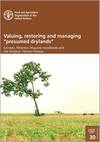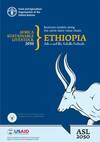The study "Valuing, restoring and managing presumed drylands: Cerrado, Miombo–Mopane woodlands and the Qinghai–Tibetan Plateau" confirms the existence of 1 075 million hectares of presumed drylands that are under threat from unsustainable use and climate change. This is in addition to the 6.1 billion hectares of official drylands that already cover 41 percent of the planet’s land surface and are home to 2 billion people. All these areas contain high levels of biodiversity and are home to a large number of people reliant on agriculture to sustain their livelihoods, this is why it's so important to research, analyse and work to protect them. The report contains concrete information on the environmental and ecological value of these dryland areas, and key recommendations for actions to limit land degradation, sustain biodiversity and mitigate climate change.
Year of publication: 2022Organization: Food and Agriculture Organization of the United Nations (FAO)
Topic: Climate change, Environmental services, Food security, Land
Language: English
Type of document: Technical
Geographical coverage: Global
The FAO partnered with the Ethiopian Society of Animal Production (ESAP) to understand and document the various business models along the cattle dairy value chain nodes in Ada’a and Sululta districts. Dairy businesses are highly heterogeneous in Ethiopia and, even though most are profitable, milk production, marketing, service, input and other support are not well organized and integrated. Investments to make the dairy value chain more effective should target more institutional than the technical dimensions, which entails a novel approach for veterinary and animal production services.
Year of publication: 2022Organization: Food and Agriculture Organization of the United Nations (FAO), Individual authors, United States Agency for International Development (USAID)
Topic: Economy, Value addition
Language: English
Type of document: Technical
Geographical coverage: Eastern Africa
This guidance document presents the latest version of the questionnaire, SHARP+ 2020, scoring system and tablet application based on the two technical reviews mentioned above. This document walks the reader through a step-by-step process to set up the SHARP+ assessment, adapt it to the local context, and use it to collect and analyse information about household resilience in the context of climate change. The new material presented is for use by practitioners in the future implementation of SHARP+ in the field.
Year of publication: 2022Organization: Food and Agriculture Organization of the United Nations (FAO), Individual authors
Topic: Climate change, Economy, Resilience
Language: English
Type of document: Technical
Geographical coverage: Global
Large-scale renewable energy projects are being developed in the drylands of Africa, Asia and Latina America without adequate consultation with pastoralists that have been using the land for grazing their livestock since time memorial. This report examines evidence from existing large-scale projects. It argues that an inclusive participatory design of such projects is necessary to safeguard human rights and ensure mutual benefit for pastoralist communities and society at large.
Year of publication: 2022Organization: Heinrich Böll Stiftung, Regional Office for East & Horn of Africa, Individual authors
Topic: Innovation
Language: English
Type of document: Technical
Geographical coverage: Global
This Rift Valley Framework Action Framework is intended to provide decision makers with guidance on the best course of action to take in response to an RVF outbreak or the risk of an outbreak, and help them develop a national action plan for this response. A coordinated One Health approach that brings together the public, animal and environmental health sectors is recommended, as is a risk-based approach that uses risk assessment and mapping to determine the appropriate measures to be taken and the locations where they are required. A country’s RVF response can be best broken down into the four phases of the epidemiological cycle: the inter-epidemic, pre-epidemic, epidemic and post-epidemic periods.
Year of publication: 2022Organization: Food and Agriculture Organization of the United Nations (FAO)
Topic: Environmental services, Resilience, Social services
Language: English
Type of document: Technical
Geographical coverage: West Africa, Central Africa, Eastern Africa, Southern Africa
To promote FAO's work in partnership with civil society organizations (CSOs), PSUP has produced partnership briefs to highlight work done in recent years with some CSO partners. This specific brief highlights the work done together with World Rural Forum particularly those activities in support of the UN Decade of Family.
Year of publication: 2022Organization: Food and Agriculture Organization of the United Nations (FAO)
Topic: Climate change, Economy, Environmental services, Food security, Innovation
Language: English
Type of document: Technical
Geographical coverage: Global
Pastoralism in Asia features a variety of agro-ecological and socio-cultural settings. From Russian Siberia to Indian drylands, the continent is home to large and diverse pastoral territories and communities. Policies and legislation regulating rangeland governance and livestock production are of great concern in the region, as they affect the livelihoods of significant parts of the population.
Year of publication: 2022Organization: Individual authors
Topic: Climate change, Conflict, Economy, Environmental services, Food security, Land, Resilience, Social services
Language: English
Type of document: Technical, Policies and legislation
Geographical coverage: Central Asia, South Asia
Transboundary pastoralism is practiced in CAR by Cameroonian, Chadian, Sudanese, and South Sudanese groups of herders. This activity is met with challenges ranging from cattle theft, farmer grazier problems, and armed groups activities which lead to incidents that are at times fatal. Data from the Armed Conflict Location & Event Data Project (ACLED) publicly available, were analyzed to identify locations where a transhumance incidence occurred and subprefectures that are access constraints and food insecure due to the occurrence of transhumance incidences. Hotspot analysis provides a way to show the relationship between features and whether high or low values cluster spatially.
Year of publication: 2022Organization: World Food Programme (WFP)
Topic: Conflict, Food security, Resilience
Language: English
Type of document: Technical
Geographical coverage: Central Africa









